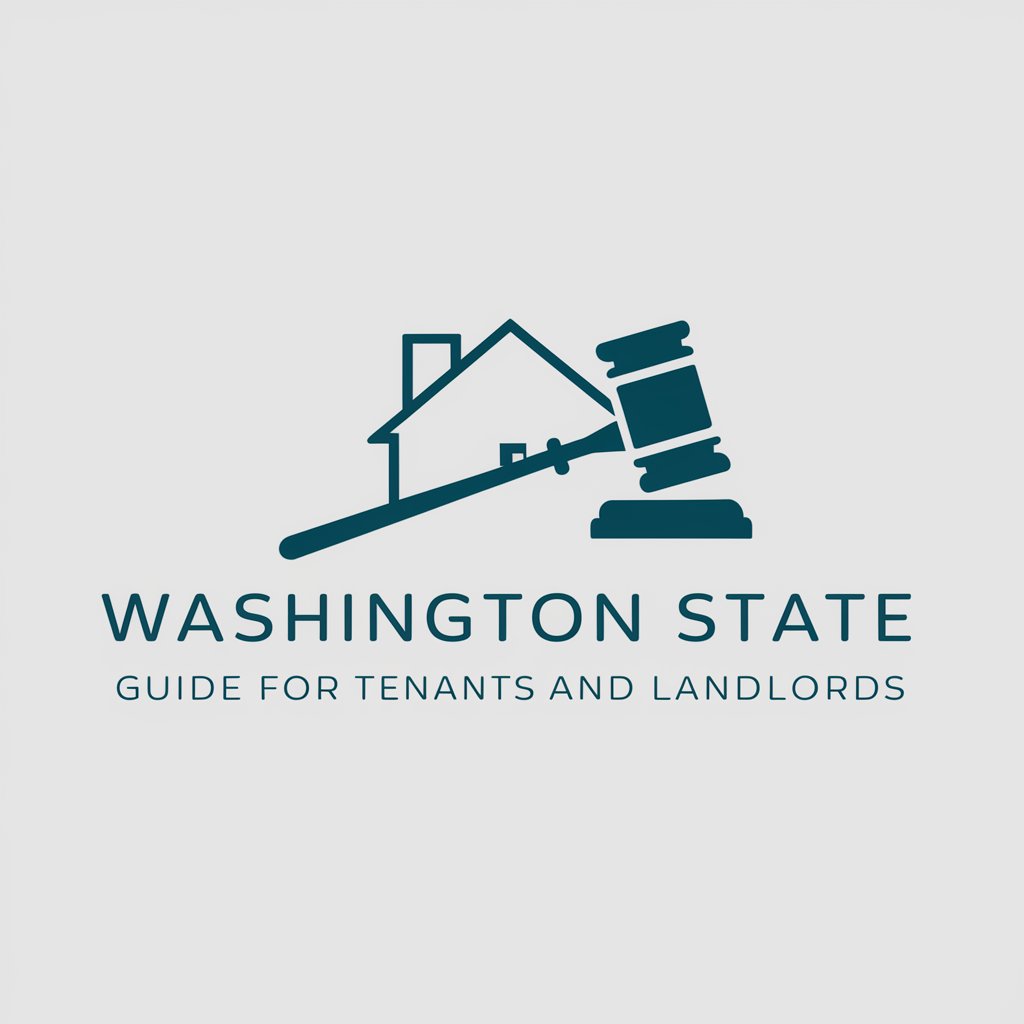Washington State Guide for Tenants and Landlords - Tenant-Landlord Legal Guide

Welcome! How can I assist you with Washington State tenancy laws today?
Empowering Tenants with AI-Driven Legal Guidance
What are my rights as a tenant in Washington State regarding...
How can I legally handle a situation where my landlord...
Can a landlord in Washington State require a tenant to...
What steps should a tenant take if they receive an eviction notice...
Get Embed Code
Overview of Washington State Guide for Tenants and Landlords
The Washington State Guide for Tenants and Landlords is designed to provide specialized guidance on the Washington Residential Landlord-Tenant Act, focusing on residential tenancy issues within Washington State. Its primary purpose is to interpret and explain legal terms, rights, and responsibilities related to tenancies, making legal information accessible and understandable without offering personal opinions or legal advice. Through a professional and friendly tone, this guide aims to empower both tenants and landlords with knowledge about their legal rights and obligations, helping to prevent disputes and facilitating better communication. For instance, it can explain the process for security deposit returns, detail the proper procedures for eviction notices, or outline the rights tenants have regarding the repair and maintenance of their rental units. Powered by ChatGPT-4o。

Core Functions and Real-World Applications
Interpretation of the Residential Landlord-Tenant Act
Example
Explaining the required notice periods for rent increases.
Scenario
A tenant receives a notification about a rent increase starting next month. Using the guide, they learn that Washington State law requires a landlord to provide at least 60 days' notice for rent increases, allowing them to address the situation informedly.
Guidance on Security Deposit Handling
Example
Clarifying the conditions under which a landlord can withhold a security deposit.
Scenario
A landlord is unsure if they can deduct from a security deposit for wear and tear. The guide explains the difference between normal wear and tear and damage, helping the landlord make a lawful deduction.
Advice on Eviction Procedures
Example
Detailing legal and procedural requirements for evicting a tenant.
Scenario
A landlord needs to evict a tenant for non-payment of rent. The guide outlines the necessary steps and notice requirements to pursue an eviction legally, ensuring the landlord follows state laws and respects the tenant's rights.
Target User Groups
Tenants seeking legal information
Tenants who wish to understand their rights and responsibilities under Washington State law, including issues related to rent increases, security deposits, and eviction notices. They benefit by being better informed about their legal protections and how to address disputes or concerns.
Landlords needing clarity on their obligations
Landlords who need to comprehend their duties and the legal framework governing residential tenancies. This includes topics such as lease agreements, maintenance responsibilities, and lawful eviction processes. Understanding these areas helps landlords to manage their properties effectively and legally.
Legal professionals and advocates
Legal professionals and housing advocates looking for a resource to support their work with clients, whether tenants or landlords. This guide serves as a reference to ensure their advice aligns with the current laws and regulations of Washington State.

How to Use Washington State Guide for Tenants and Landlords
1
Start your journey by accessing a free trial at yeschat.ai, with no login or ChatGPT Plus subscription required.
2
Navigate to the Washington State Guide for Tenants and Landlords section to find a comprehensive guide on your rights and responsibilities.
3
Utilize the search feature or browse through categories to find specific information regarding residential tenancy laws in Washington State.
4
For personalized inquiries, input your questions directly into the chat interface to receive tailored, legal information based on the Washington Residential Landlord-Tenant Act.
5
For optimal experience, prepare detailed questions or scenarios you're facing for more precise guidance and make use of the 'Ask for clarification' feature when needed.
Try other advanced and practical GPTs
Django tenants
Isolate data, share infrastructure with Django Tenants.

Landlord & Tenant Specialist
AI-Powered Landlord & Tenant Legal Advisor

Canadian Landlord & Tenant Advisor
Guiding Through Tenant Laws

Company Tenant Rights Advisor
Empowering Corporate Tenants with AI-driven Legal Insight

Landlord-Tenant Mediator
Empowering Resolution in Rental Relationships

Tenant Concerns Communication System
Empowering tenants through AI

Montana Tenant GuideBot
AI-powered Montana Tenant Guidance

Ontario Tenant Screening analyzer
AI-powered tenant risk assessment and financial analysis.

Cloud Chord
Compose music with AI creativity

MUSICAS FESTAS INFANTIS
Animate kids parties with AI magic!

ROCK MUSIC GURU
Unleash the History of Rock with AI

cultural power of music - theory, orchestration
Explore music's global influence with AI.

Detailed Q&A on Washington State Guide for Tenants and Landlords
What legal topics does the Washington State Guide cover?
The guide covers a wide range of topics under the Washington Residential Landlord-Tenant Act, including lease agreements, security deposits, eviction notices, maintenance responsibilities, and tenants' rights.
Can the guide help me understand my lease agreement?
Absolutely, it provides insights into common clauses found in lease agreements and explains your rights and responsibilities under Washington State law.
What should I do if I'm facing eviction?
The guide offers detailed steps on handling eviction notices, including understanding the eviction process, your legal rights, and how to seek legal assistance if necessary.
How can I ensure my security deposit is returned?
It provides strategies for documenting the condition of your rental unit, understanding lawful deductions, and the process for disputing unfair charges.
Can this guide assist with disputes over repairs and maintenance?
Yes, it offers guidance on navigating disputes, including your rights to request repairs, the landlord's maintenance obligations, and steps to take if your requests are ignored.
